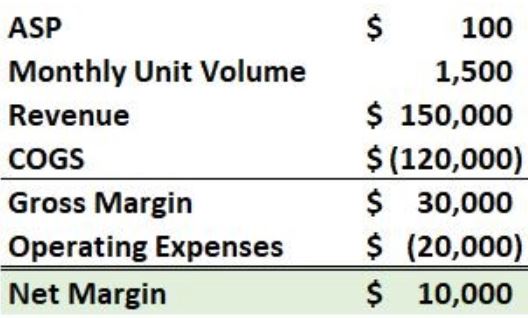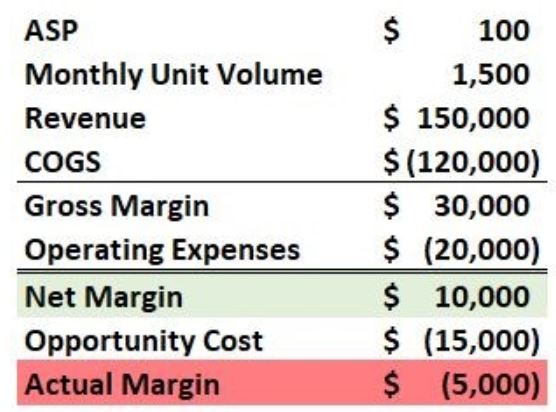Know your Metrics, Know your Business
Know your Metrics, Know your Business
How well do you know your key metrics? I mean, really know them? Do you know your customer acquisition cost, per unit margin, and if your oldest customer is actually profitable?
If you're a manufacturing company, how are you tracking your efficiencies or production capabilities? How are you tracking your churn or conversion rates if you're a software company?
Seeing your revenue grow is always a great feeling but the true measure of how well your business performs is the bottom line of your profit and loss, or P&L. Having a solid understanding of your metrics isn't just about talking finance. It's the dashboard into the health of your business, and it's not always evident from your financial statements alone.
Business Benefits To Understanding Your Metrics
Understanding your key metrics is essential to successfully operating a business in the dynamic supply chain landscape. Identifying and comprehending these numbers have several benefits, such as:
- Informed Decision-Making: Metrics provide valuable insights for making informed decisions across various aspects of your business.
- Efficiency Improvement: Understanding metrics like production capabilities or customer acquisition costs can help streamline processes and improve efficiency.
- Profitability Analysis: Metrics like per unit margin and customer profitability offer a deeper understanding of the overall profitability of your operations.
- Strategic Planning: With accurate metrics, you can develop and implement strategies to promote business growth and success.
- Financial Transparency: Metrics enhance financial transparency, helping you identify areas that contribute most to your bottom line.
- Informed Decision-Making: Metrics provide valuable insights for making informed decisions across various aspects of your business.
- Efficiency Improvement: Understanding metrics like production capabilities or customer acquisition costs can help streamline processes and improve efficiency.
- Profitability Analysis: Metrics like per unit margin and customer profitability offer a deeper understanding of the overall profitability of your operations.
- Strategic Planning: With accurate metrics, you can develop and implement strategies to promote business growth and success.
- Financial Transparency: Metrics enhance financial transparency, helping you identify areas that contribute most to your bottom line.
- Performance Evaluation: Regularly tracking metrics allows for ongoing evaluation and adjustment of business strategies for optimal performance.Informed Decision-Making: Metrics provide valuable insights for making informed decisions across various aspects of your business.
Efficiency Improvement: Understanding metrics like production capabilities or customer acquisition costs can help streamline processes and improve efficiency.
Profitability Analysis: Metrics like per unit margin and customer profitability offer a deeper understanding of the overall profitability of your operations.
Strategic Planning: With accurate metrics, you can develop and implement strategies to promote business growth and success.
Financial Transparency: Metrics enhance financial transparency, helping you identify areas that contribute most to your bottom line.
Performance Evaluation: Regularly tracking metrics allows for ongoing evaluation and adjustment of business strategies for optimal performance.
Informed Decision-Making: Metrics provide valuable insights for making informed decisions across various aspects of your business.
Efficiency Improvement: Understanding metrics like production capabilities or customer acquisition costs can help streamline processes and improve efficiency.
Profitability Analysis: Metrics like per unit margin and customer profitability offer a deeper understanding of the overall profitability of your operations.
Strategic Planning: With accurate metrics, you can develop and implement strategies to promote business growth and success.
Financial Transparency: Metrics enhance financial transparency, helping you identify areas that contribute most to your bottom line.
Performance Evaluation: Regularly tracking metrics allows for ongoing evaluation and adjustment of business strategies for optimal performance.
Let have a look at a greatly simplified real-life example:
Let’s say you are a manufacturing company that makes a variety of widgets on a common manufacturing line. Overall you are a profitable business but you’ve never looked at the profitability of your individual SKUs. Let’s look at one SKUs, Product Y.

At a high level, you think you're making almost 7% net margin on this product line. However, let's say the machine setup and switchover for this product is very complicated and takes a lot of time. So much time, in fact, that you could have run enough units of an alternate product line to make $15,000 in net margin simultaneously. Factoring in the lost margin opportunity, here's the real impact on your business.

The answers to what to do next aren’t always simple. What if this is a key product for your most strategic customer? However, understanding the situation enables you to act.
Using information to act is making an informed decision. Acting without knowledge is guessing.
Understanding how your business operates is the key to finding these hidden costs, which we refer to as "leakage." It flourishes in environments where you're not looking at the broader scope of your business.
The right metrics can help you identify leakage and prevent it from spreading.
It is worth noting that this approach doesn't work with a startup or a new venture within a company. However, thinking in these terms allows you to determine your profitability path. If you can speak with knowledge, your investors and stakeholders will have increased confidence in your plan.
Related Read: 6 Key Metrics to Improve Your Inventory Storytelling
Understanding your key metrics isn't just a financial exercise; it's the compass guiding your business and supply chain operations toward efficiency, profitability, and strategic success. If you find navigating through the maze of key metrics challenging, the experienced supply chain consultants at Waypost Advisors are ready to assist you in identifying, measuring, and leveraging these essential indicators for optimized business and supply chain performance.
Waypost Advisors is an end-to-end supply chain and resourcing solution. We offer expertise in procurement, inventory, project management, planning, transportation & warehousing to fit the needs of your B2B manufacturing or distribution company. Our advisors can provide you with the resources and expertise to tackle your supply chain challenges while allowing you to still focus on running your business.
